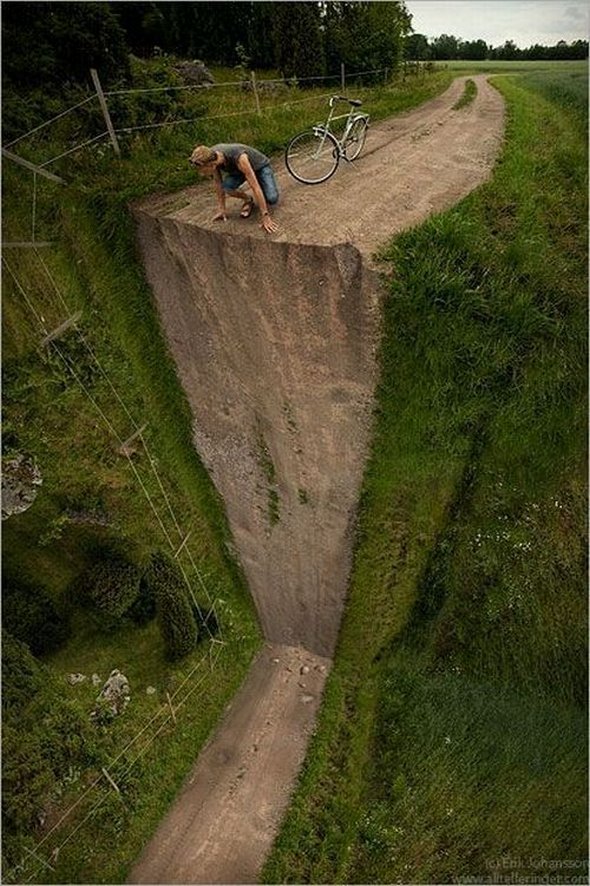Comments
-
Wiser Words Have Never Been SpokenIndeed I am still checking in at PF, but have the feeling that my days there are numbered.
I was contacting 'theSoren' a bit to get a bit more of a picture of what is really the intention and direction of PF. It's sort of like driving by a former home to see what the new buyers have done with it.
There are moments where it is difficult to 'let go', but it seems as if it is not really what it used to be, so the 'letting go' might well have been taken care of for me, as hat it was is not longer there to hold.
I will post now and then there, but for the most part as to keep contact with folks who might well be interested in looking into our new option.
This is not so much a territorial war, but more a realization that this is no longer really home.
Anyway...
in the words of the band that brought me back to philosophy, Maximo Park:
"What happens when you lose everything?
You just start again
You start all over again!"
For me... somewhat autobiographical, right down to the nose bleed out of the left nostril (exactly what happened when my head literally exploded a few years back).
Meow!
GREG -
How will this site attract new members?This is terrible, but it came from my wife and not me.
She noticed that the websites of Vaygmedia were:
Mom Training
Yummy Deserts
Top Fashion Wear
Glamor Post
Fashion Fixation
Fashion Scope
She ask me why the owner of this stuff is so stupid and cannot spell.
It should read:
'Vaginamedia'.
WOW! :-O
Meow!
GREG -
How will this site attract new members?
Or an evolution vs. intelligent design debate....
http://thephilosophyforum.com/discussion/44/we-still-havent-had-an-evolution-vs-intelligence-design-debate-on-these-forums#Item_2
... or rather not.
Let's keep the twatterish farcebook crowd elsewhere. Besides... they have sooo many options anyway...
... oh!
And who really enjoys 'traffic'? >:O
Meow!
GREG -
Wiser Words Have Never Been SpokenReminds me...
Should I invite Schlitz?
He also had some really great posts.
Meow!
GREG
btw... did you like how I suggested we should maybe form a club? ;) -
Wiser Words Have Never Been Spoken
Whilst many that come here do use Twatter and farcebook to keep in touch with others, a lot of us come here to avoid the high quantity and quality of the stupidity found on those mostly brainless areas of the internet and avoid the multitude of ads, likes, followers, and general bullshit that so blocks up your thinking processes. — SIR2U
Taken from a place far far away. :D
Meow!
GREG
btw... How about them apples... you can cut and paste a quote from our old home here in our new home. SHAZAM! -
Welcome PF members!↪Agustino Great to see you here 'stino. You've written some great posts already. — jamalrob
Agreed!
... and it's stuff I'm not scared to death to respond to with one of my senseless rants. :D
Glad you're here dude!
Meow!
GREG -
Against Ethics?
This is why we need internal replies. This is one.
Honestly, every time some crap I rant about sounds like something someone said, who I've never read before (and who is indeed creditable), well... frankly... it spooks the hell out of me. :-O
Meow!
GREG -
Against Ethics?This is gonna be rather off the mark, but...
Morality is an informal public system applying to all rational persons, governing behavior that affects others, having the lessening of evil or harm as its goal, and including what are commonly known as the moral rules, moral ideals, and moral virtues.
Ethics is the philosophical study of morality. It is divided into the general study of goodness, the general study of right action, applied ethics, descriptive ethics, metaethics, moral psychology, the metaphysics of moral responsibility, etc.
The former is the latter's subject matter. - Wolfman
I sort of felt compelled to post this definition and distinction.
It might be me, but I can't help but feel that these 'ethical systems or ways of living' are less particulars and more generalization, where the morality involved may or may not reflect the system or way of life on a consistent basis.
Indeed I find that such ethical systems or ways of life are founded upon reasoning, but I do not think that such ethical systems or ways of life are anymore than a set of 'guidelines' for actions and are not really the actions themselves.
With the ethical systems and ways of life being guidelines, this allows degrees of freedom within as variables not covered in the basic concepts present themselves. This allows adaptation and refinement of ethical reasoning, via moral application. Also, it does not 'disinclude' errors or what happen to be seemingly contradiction, as these would play a role in the adaption and refinement of an ethical systems as a guideline.
But isn't this whole approach founded on the assumption that a valuable life is a life in which suffering is minimised and joy is maximised? — Agustino
Well... isn't the assumption of value regarding what is suffering or joy relative to the context in which this vale is being fielded?
A rather trivial example of this would be eating food you like the taste of, in that how much is too much.
Indeed if you like that taste, it is a joy, but if you have to eat 20 times the normal amount then it is suffering. Depending upon if you are more or less hungry the amount of food intact of this tasty food would dictate where the line is between joy and suffering. Oh... and what if you happen to have another value in play... say weight loss? Indeed the food might grant pleasure in it's taste and this being part of the good life, but it is often amazing just how much of the good life can simply stick to your bones; thus not such a good thing in the context of weight loss.
Here's the fun bit when addressing ethical systems and ways of life... what is the context of intention and the specific standard of measure to decide of something if indeed good or bad or better or worse?
Personally I feel most all of these ethical systems and ways of life have a great deal to offer in possible structure to field a value notion, but they are simply the 'blue prints' and not the actual structure being built.
Perhaps these systems and ways of life offer up a logical and reasonable structure, but as unknown variables enter the picture, we are sort of force to 'think on our feet while running'; thus the logic and reasoning being adapted or even possibly ignored at times.
Let me know if any of this makes sense.
I suppose my rant in short form is that ethical systems and ways of life are 'blue print structures' founded upon logic and reasoning and moral action is based upon these systems, but is not always consistent with them as there are just too many unknown variables that alter the best intentions and plans.
I kind of got lost on the way to this point and I'm not too sure that's what I really mean either. Maybe you can fix it for me. :D
Meow!
GREG -
Icon for the Site?I guess while we're going that route... — discoii
Ahhh...
Somthin fer da Dads!!!
... ain't it the truth! :D
Meow!
GREG -
Welcome PF members!
I did send him info of the new website via a PM in PF. I'm not too sure if he gets those anymore, but I indicated it was from me. I always had a good rapport with him.
Meow!
GREG -
Things at the old place have changed
That makes sense...
... truth is, I'm very surprised I have not yet been banned as I have been using the PM modus to 'inform' members of PF about this as an alternative or a possible means to keep the community intact.
I have managed to send out nearly 80 PMs.
Perhaps he's just not paying that much attention to PMs sent. Something good... I guess.
Meow!
GREG -
PF sold for $20,800
I totally understand you Paul.
I think also how times have changed, in that public Forums are not really 'non-profit' anymore play a bit role.
The bottom line for many is and well... sort of has to be earning an income.
Truth is, I think the buyer could have even been worse... far worse, but no matter who the buyer was/is... you still accomplished a great thing with PF.
Let's not fret about 'unringing bells' and simply move on.
The community that you managed to bring together in PF over all those years is now the community that has set this Forum into motion. Considering it has been up for... gee whiz... how few days now and to see just how many people it has attracted... Paul, that's a credit to you.
Without your vision of PF, this community effort would not be possible.
Who knows where this is going?
Perhaps it's my stupid happy go lucky absurdist traalaalaa take on life that see it this way, but to be honest... maybe the realization of losing something of great value needs to be felt now and then for us to appreciate the value it has for our lives.
I know...
... it's sappy dribble and reads like a fortune cookie, but hey... isn't it amazing how your community can step up to the plate and hit one out of the park without even warming up?
Thanks Paul! :D
So happy you're here!
Meow!
GREG -
Welcome PF members!Xyzjoel wasn't mentioned. — Hanover
I just sent him an invite. (xzJoel to be exact)
I think he's a bit busy with work and new family.
He was the first person in PF to have corrected my ranting. I'm forever in his debt.
Meow!
GREG -
Welcome PF members!Who's this Saphsin guy? I don't recall him from the old PF. — Wosret
I think I've had about 20 PM exchanges with Saphsin.
Nice guy! :D
He's one of my invites.
Also and Anime freak! ;)
Meow!
GREG -
Welcome PF members!
Kind of like me, eh Paul?
I'm also a 'one trick pony'. ;)
I could invite him too. He is from Virginia, where I originated and we did have a good connection.
Meow!
GREG -
Icon for the Site?I sort of prefer a happier face, as this is supposed to be fun...





...just a few suggestions.
Meow!
GREG -
Icon for the Site?
I fear this poor chap had a bad result from an MRI.
He should probably get those dots removed. (me speaking from experience)
Meow!
GREG -
RefugeesIf you think anything I ever say has enough merit, feel free to let my rants go public.
I just feel I'm more qualified as a comedian than I'm qualified as a philosopher.
Please... no one comment on that.
I'm not digging to attention or compliments. I just know my limits and find myself in terms of philosophy mediocre at best. We have some really good people here. That's why I like to be here... to learn.
So, enough lying on the couch with Freud...
... back to the topic at hand.
Meow!
GREG -
Welcome PF members!My wife just stated she hope the new SuperAd bans me from PF soon for inviting everyone, so that I finally go to bed.
I'll see you guys later.
Personal invites are a very good means of letting people know there are other options if they so care to leave PF. It is a personal community. A great community.
Meow!
GREG -
Refugees
Thanks Tiff... all I need now is a Facebook account.
Please quote some of the other people here... I'm not really that good at this sort of philosophy thing.
Meow!
GREG -
Welcome PF members!You mentioned NeubergCrowley twice. — Sapientia
Well... we need him here and I'm 200% sure of that!
Meow!
GREG -
Welcome PF members!Er... how do I send a PM to multiple members at once? I must be doing it wrong? — Sapientia
I simply wrote each person in an individual PM with a central copy paste message without me saying they should come, but stating that this was a viable option if PF is not for them or if they have lost faith in the new owners.
It was a hour or so well spent.
Meow!
GREG -
Welcome PF members!So far I've PMd (who isn't here yet)
180 Proof, NeubergCrowley, MarchHare, ragus, FrankLeeSeaux, stephnlawrnce, Agustino, Csalisbury, ZzzoneiroCosm (no seriously!), Mr. Gorbag, psychotick, Q~uestion, Sam26, prothero, anonymous66, dclements, TheDivineFool, Mars Man, Unexpiritualized, angslan, Arkady, creative, Tagg, mutemaler, lambda911, stax (yes! stax), pkautz223, Wolfman, Tobias, fdrake, throng, Luke C, Joey Joe Joe Jr Shabadoo, Philo1965, Nihilistic Locomotive, NeubergCrowley, MrSkeptic, AbsurdRhetor, demonstrable, and will invite Kwalish Kid only if I have permission.
I might have missed a few names there, but I have sent out 65 invites.
btw... someof them to the older website so you might wish to look into that from time to time Jamalrob!
Cheers!
Meow!
GREG -
We still haven't had an evolution vs intelligence design debate on these forumsWe're missing a suicide threat debate, an antinatalism manifesto and a free will redux too. >:O
Meow!
GREG -
How will this site attract new members?I just sent out 15 more invites, as my PM modus in PF was operational again.
Let's see if anyone comes.
Meow!
GREG -
Welcome PF members!
He was fun.
I could also get in touch with The Death Monkey and Kwalish Kid... also Stax.
Meow!
GREG -
Things at the old place have changed
One thing that seems to be missing are the 'newbies'.
They are a source for 'new' threads, as us 'oldies' tend more to reply than post new threads.
Meow!
GREG -
Welcome PF members!
180 proof, Psychotick, Anonymous66, March Hare, The DivineFool , Agustino, Soylent to name a few.
also a few newbies like AbsurdRhetor.
Meow!
GREG -
Welcome PF members!I just knew the Kant favicon would be controversial. — jamalrob
Imagine if you used Ayn Rand?
WOW! :-O
Meow!
GREG -
Welcome PF members!Maybe eventually we can change the icon from Kant to something non-white. — discoii
If I get 180 Proof to come over to the party, can we use his avatar?
He's gotta be one of the finest philosophers I know.
Meow!
GREG -
How should one think about Abstract Expressionism?I can't explain it.
I could just as well say that I can actually visually 'feel the texture and temperature', 'taste the flavor of colors', 'hear the movement just hanging there' and 'smell the depth and perspective' of the painting of Jasper Johns or Pollock or Rauschenberg. :B
My main criteria of art is 'does it appeal to me'. How it appeals depends upon when and where you ask me. It just works.
I have an apartment full of various works of art. Some of the artists are known and others not. I just simply collected what appealed to my senses. (My wife recently talked me out of buying a Rauschenberg when In Nizza... gee whiz! It was rather inexpensive... oh well.)
As for why your drippings and droppings are not as valued by me...
... I've never seen them, so I can't say for sure.
Meow!
GREG -
PF sold for $20,800I really wished I had the finances to have bought it (for a lot more than Paul got).
I would have loved to own the Forums and just be a member. With my dyslexia, there is no way for me to be an Ad or a Mod and since I know nothing about how a webpage functions, I'd say out of running things.
Indeed (my) ignorance can at time provide bliss.
Meow!
GREG -
What draws people to an online forum anyway?What drew me to PF, more or less my only online Forum, was that I was interested in philosophy and was losing my English.
What kept me there was community...
...actually more than one community.
It was a community where I could rant and roll over philosophical like sort of stuff without too many people trying to move to another seat at the table; thus not bother my other communities with the burden of having to be exposed to such obsessive/compulsive behavior.
Now that this community in PF is threatened, I'm in the process of moving...
... resulting in posts like this one on this online forum.
Meow!
GREG -
Things at the old place have changedIndeed things have changed...
The shoutbox had something interesting.
SittinWSocratesTiff [Oct 23, 2015 - 8:40 PM]: As soon as I knew there was a possibility that funds were not going to be going directly to the previous owner and our dear hosted server, I immediately discontinued asking for *Sponsorship or *Donations. It's no longer something that is necessary
ProbablyTrue [Oct 23, 2015 - 8:06 PM]: Should maybe get rid of the donation/sponsorship link since this site is going to be monetized now..
This was the reply to Tiff...
[1:14 AM]: Tiff's life has been made easier. I call that a win!
Funny...
The response was by the 'invisible hand'. No user name and no one that shout connects with...
... things that make you go hmm...
Funnier still was that SuperAd was all over Tiff's profile after coming on and seeing her shout.
I had to play too...
... my response to the 'invisible hand':
mayor of simpleton [1:30 AM]: Not in all cases... often an easy win is a shallow victory. Not too sure I'd be happy pitching baseball against a team of Little League kids. Personally I like challenges. https://www.youtube.com/watch?v=vEy9Hp1GoLw
Curious if my profile is next for review?
Meow!
GREG
I decided to ask this too:
mayor of simpleton [2:01 AM]: btw... Who are you? I mean the one who replied to Tiff... I wasn't aware we had anonymous shouting.
So far no reply...
again... hmm... -
Feature requestsI'm really slow at these things, but I can usually find a way to trick the computers to do my will even if they think they are dictating my life.
I have to get to the rowing machine now.
My old bones hurt, but it has to be done.
There's no app for that...
Meow!
GREG -
Feature requestsHere's the magic...
... I'm going to remark the quote, as if I'm going to post again. I will copy the correct bit in this new attempt into the old attempt. and add in the missing bits.
Meow!
GREG
Mayor of Simpleton

Start FollowingSend a Message
- Other sites we like
- Social media
- Terms of Service
- Sign In
- Created with PlushForums
- © 2026 The Philosophy Forum
